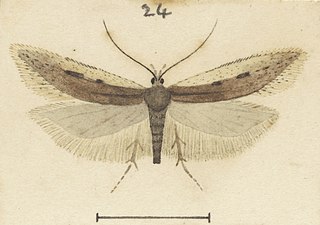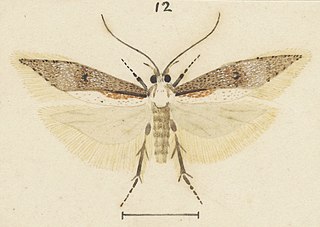
Kiwaia is a genus of moths in the family Gelechiidae. Two subgenera are currently recognised, (i) the nominotypical subgenus with 25 species from New Zealand, and (ii) subgenus Empista with 4 species from the Palaearctic Region.

Notocelia uddmanniana, the bramble shoot moth, is a moth of the family Tortricidae. It is found in Western Europe and the area surrounding the Mediterranean Sea all the way up to the Caucasus, Kazakhstan, Iran and China.

Falcaria lacertinaria, the scalloped hook-tip, is a moth of the family Drepanidae. The species was first described by Carl Linnaeus in his 1758 10th edition of Systema Naturae It is found in Europe and Anatolia then east to Eastern Siberia.

Agonopterix arenella is a species of moth of the family Depressariidae. It is found in all of Europe, except the Iberian Peninsula.

Carcina quercana is a species of moth of the family Depressariidae. It is found in Europe. It has been introduced recently in North America, British Columbia and western Washington. It is occasionally known by several common names including oak lantern, long-horned flat-body, and oak-skeletonizer moth.

Acleris rhombana, the rhomboid tortrix, is a moth of the family Tortricidae. It is found in the Palearctic realm, from Europe to the Caucasus, Armenia, and Turkmenistan.

Paraswammerdamia lutarea is a moth of the family Yponomeutidae. It is found in Europe.

Prolita sexpunctella, the long-horned flat-back or groundling, is a moth of the family Gelechiidae. It is found in most of Europe and North America.

Kiwaia aerobatis is a moth in the family Gelechiidae. This species was first described by Edward Meyrick in 1924. It is endemic to New Zealand and has been collected at Mount Arthur and at Arthur's Pass. Adults are on the wing in January.

Kiwaia cheradias is a species of moth in the family Gelechiidae. It was described by Edward Meyrick in 1909. It is endemic to New Zealand.

Kiwaia glaucoterma is a species of moth in the family Gelechiidae. It was described by Edward Meyrick in 1911. It is endemic to New Zealand.

Kiwaia heterospora is a moth in the family Gelechiidae. It was described by Edward Meyrick in 1924. It is found in New Zealand.

Kiwaia hippeis is a moth in the family Gelechiidae. This species was first described by Edward Meyrick in 1901. It is endemic to New Zealand and has been collected in Christchurch. Adults of this species are on the wing in December and are attracted to light.

Kiwaia lapillosa is a moth in the family Gelechiidae. It was described by Edward Meyrick in 1924. It is found in New Zealand.

Kiwaia lithodes is a moth in the family Gelechiidae. It was described by Edward Meyrick in 1886. It is found in New Zealand.

Kiwaia parapleura is a moth in the family Gelechiidae. It was described by Edward Meyrick in 1886. It is found in New Zealand.

Kiwaia plemochoa is a moth in the family Gelechiidae. It was described by Edward Meyrick in 1916. It is found in New Zealand.

Kiwaia schematica is a moth in the family Gelechiidae. It was described by Edward Meyrick in 1885. It is found in New Zealand.

Kiwaia neglecta is a moth in the family Gelechiidae. It was described by Philpott in 1924. It is found in New Zealand.

Kiwaia pumila is a moth in the family Gelechiidae. It is endemic to New Zealand. It is classified as Nationally Vulnerable by the Department of Conservation.




















